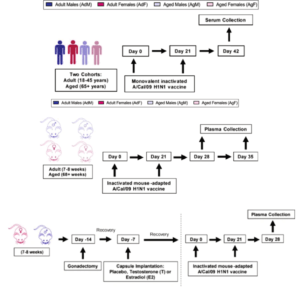
Illustration of Human and Murine experimental plan used in Portluri et al.,. (Source: Portluri et al., 2019)
Seasonal influenza infections, commonly known as flu, causes great morbidity and mortality in infants and individuals older than 65 years. As a result seasonal flu vaccination is highly recommended for these high risk groups. Researchers have observed sex differences in influenza vaccine induced immunity, illustrated by faster seroconversion, higher titres of neutralising antibodies (Abs) and lower hospitalisation rates in females compared to males. Most of these studies did not stratify gender based differences according to age. Potluri et al., aimed to determine how sex and age impact influenza vaccine induced immunity in humans and mice.
In response to influenza vaccination, adult females (18-45 years) produced higher levels of the pro-inflammatory cytokine IL-6, than same aged males and older females (>65 years). Interestingly they didn’t observe sex based differences in levels in vaccine-induced Ab levels nor neutralisation capacity. However, they did observe age based differences in females where older females had significantly lower levels of vaccine induced Ab and neutralisation capacity. Additionally, they showed a positive correlation between estradiol and vaccine induced humoral immunity. Where lower levels of estradiol was associated with lower vaccine-specific Abs. Thus suggesting reduced vaccine immunity in older females could be associated with lower estradiol. Researchers utilised a murine model of influenza vaccination to investigate this, by measuring vaccine induced immunity in gonadectomised (gdx) male and female mice. They showed that when gonads were removed male and female mice had similar levels of vaccine induced immunity. Supplementation with estradiol in gdx female mice but not gdx testorone in male mice rescued antibody vaccine induced immunity. These results highlight a potential role of estradiol in influenza vaccine immunity, which needs to be studied further.
Journal Article: Potluri et al., 2019. Age-associated changes in the impact of sex steroids on influenza vaccine responses in males and females. npj Vaccines










